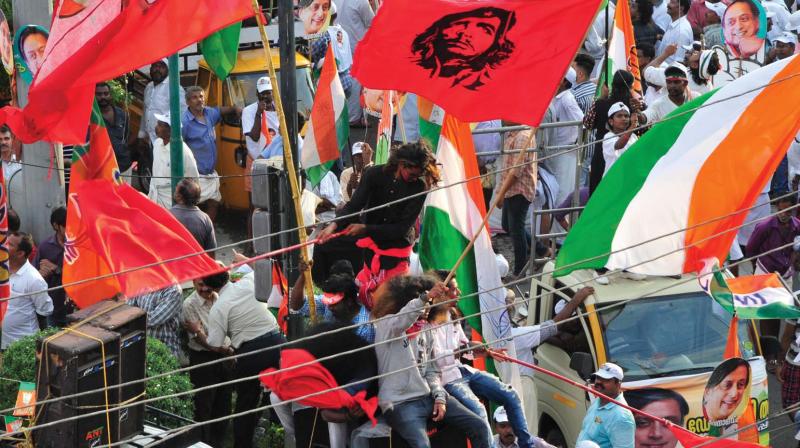Poll campaign mum on key issues

Kochi: The over a month-long campaign for 20 Lok Sabha seats in the state came to an end with vociferous theatricals and the usual quota of street brawls by the rival political outfits on Sunday.
A perusal through the campaign narrative by major political outfits shows that none of them was able to focus on the specific issues and challenges that will have a significant bearing on the social and economic sustainability of Kerala.
Apart from opportunistic sabre-rattling by a few UDF leaders on the failure of the state government in the handling of the floods and the issuance of Masala Bonds the campaign landscape was largely bereft of any of major issues of the people or the ecological challenges facing the state. Apart from politically inspired rhetoric the political class largely remained silent on topics such as unemployment, investment and agrarian distress.
The much talked about 2018 floods is an example of the frivolous nature of political debates. Apart from making unsubstantiated allegations about the state government being responsible for it, the opposition parties and leaders failed to make post-flood reconstruction and rehabilitation one of the central issues of the campaign.
The opposition lost a golden opportunity to make reports of the United Nations, Asian Development Bank, World Bank and European Union Civil Protection and Humanitarian Aid a major talking point. The 440-page report titled Kerala: Post Disaster Needs Assessment Floods and Landslides - August 2018 submitted to the government in October 2018 was not widely debated so far.
The government has not taken any initiative for the broader dissemination of the report for obvious reasons.
The Opposition has the responsibility of forcing the government on the status of the suggestions and recommendations contained in the report.
Instead of making such an exercise, Congress leaders such as Ramesh Chennithala and V.D. Satheesan harped on a highly debatable report of the high court-appointed amicus curiae.
The report by the multilateral agencies gives a clear roadmap for the post-disaster reconstruction based on a four-pillar strategy.
The four pillars identified for the reconstruction of the state are Integrated Water Resources Management (IWRM), Eco-Sensitive and Risk-informed approaches to land use and settlements, Inclusive and People-Centred Approach and Knowledge Innovation and Technology.
Although each of these pillars has been delineated in detail in the report the government or the opposition have not taken any initiative for a wider discussion of these points, its relevance to Kerala, the time-frame for the implementation of these ideas.
The election campaign could have been an ideal occasion for a constructive dialogue on the issue. It is ironical that although the next south-west monsoon is only one month away, the people are still in the dark about the steps taken by the authorities on the implementation of the suggestions and recommendations made in the Post Disaster Needs Assessment report (PDNA).
A similar apathy has also prevailed in the case of the Masala Bond. The documents submitted by the government in the London Stock Exchange (LSE) for listing the bond provides a clear picture of the precarious financial situation of the state.
Instead of making the precarious financial situation of the state as the focal point the opposition provided the government with an easy escape by focusing on the CDPQ, a buyer of the Masala Bond, having a significant chunk of the shares of SNC Lavalin, the Canadian company embroiled in the scandal involving chief minister Pinarayi Vijayan.
Anyone with a semblance of an understanding of the working of the international money markets will discount the possibility of a hidden agenda by the SNC Lavalin in the investment decision made by the CDPQ.
The opposition leader would have done a major service to the state if he had focused the precariousness of the financial situation using the data provided in the offer documents given to the LSE.
The two offer documents - one having 261 pages and another 91 pages - are freely available on the LSE website.
The political class may claim that in Lok Sabha polls, mainly concerned with the ministry making in Delhi, it would be natural that state-specific issues are pushed to the background.
Perhaps it would be too much to demand something else from the political class.

